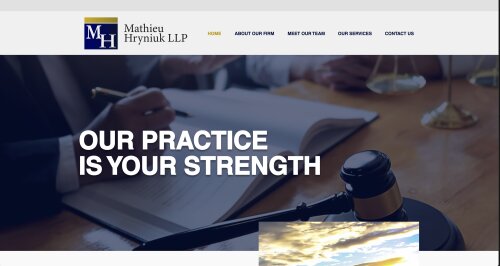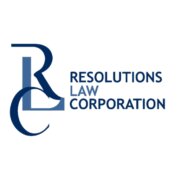Best Foreclosure Lawyers in Canada
Share your needs with us, get contacted by law firms.
Free. Takes 2 min.
Free Guide to Hiring a Real Estate Lawyer
Or refine your search by selecting a city:
List of the best lawyers in Canada
About Foreclosure Law in Canada
Foreclosure in Canada is a legal process by which a lender seeks to recover the balance of a loan from a borrower who has stopped making payments. This typically involves seizing and selling the property used as the loan collateral. Real estate foreclosures in Canada can differ from those in other countries, especially the United States, due to Canadian provinces and territories each having their own specific processes and regulations. In many Canadian jurisdictions, foreclosure proceedings are judicial, meaning they must pass through the court system before a lender can sell a property in default.
Why You May Need a Lawyer
Engaging a lawyer can be crucial in several situations involving foreclosure. If you are facing foreclosure, a lawyer can help you understand your rights and options, negotiate with lenders, and defend against the foreclosure in court. Additionally, if you believe the foreclosure was initiated improperly, legal counsel can assist in determining the validity of such claims. For investors interested in purchasing foreclosed properties, a lawyer can provide guidance on how to navigate the complex bidding process and ensure that all legal documentation is in order.
Local Laws Overview
The foreclosure process and relevant local laws in Canada can vary significantly by province and territory. Generally, the process involves the following steps: notice of default, court proceedings, order for foreclosure, and the potential sale of the property. Key considerations include understanding the differences between foreclosure and power of sale, which is an alternative process available in some jurisdictions where a lender can sell the property without going to court. It's essential to familiarize yourself with specific regional requirements and timelines in your area, as well as any potential rights to redeem the property post-foreclosure.
Frequently Asked Questions
What is the difference between foreclosure and power of sale?
Foreclosure is a court-based process where the lender takes ownership of the property. Power of sale allows the lender to sell the property without owning it first, usually through a faster process and is often used in provinces like Ontario.
Can I stop a foreclosure once it has started?
Yes, it might be possible to stop foreclosure proceedings through actions such as reinstating the mortgage, negotiating with the lender, or filing for bankruptcy. Consulting with a lawyer is crucial to assess your options.
How long does the foreclosure process take in Canada?
The duration can vary by province and specific case, typically ranging from several months to over a year, depending on court schedules and other factors.
Am I responsible for the mortgage if the property is foreclosed?
In some cases, if the sale of the foreclosed property does not cover the mortgage balance, you may still be liable for the deficit unless discharged through legal means like bankruptcy.
What happens to second mortgages or liens on the property in foreclosure?
Secondary liens might be extinguished by foreclosure unless the proceeds cover them, but those lienholders can still pursue you directly for any debts.
Will a foreclosure affect my credit score?
Yes, a foreclosure can significantly impact your credit score, leading to a negative mark on your credit report for several years.
What are my rights as a homeowner facing foreclosure?
You have the right to receive proper notice, the chance to cure the default, and potentially contest the foreclosure. Legal advice is crucial to understanding these rights fully.
Is it possible to receive assistance to avoid foreclosure?
Yes, several programs offer financial counseling and mortgage assistance to help homeowners avoid foreclosure.
Can I sell my home before the foreclosure is completed?
Yes, selling your home before foreclosure can prevent the process from completing, provided that the sale covers the mortgage debt and is agreed upon by your lender.
Does bankruptcy stop foreclosure?
Bankruptcy can temporarily halt foreclosure proceedings and potentially allow you to reorganize your payments, but it does not permanently stop the process if debts remain unresolved.
Additional Resources
For further assistance, consider reaching out to provincial government offices like Alberta's Service Alberta or British Columbia's Home Owner Grant Administration Office. National organizations such as the Canada Mortgage and Housing Corporation (CMHC) provide guidance and resources. Legal aid services in several provinces offer free or low-cost advice for those unable to afford private counsel.
Next Steps
If you need legal assistance with foreclosure, it is advisable to consult with a lawyer who specializes in real estate law in your specific provincial jurisdiction. Begin by gathering all relevant documents, such as your mortgage agreement and any correspondence from your lender. Contact local legal aid services or community legal clinics if cost is a concern. Act promptly, as time is often a critical factor in foreclosure proceedings.
Lawzana helps you find the best lawyers and law firms in Canada through a curated and pre-screened list of qualified legal professionals. Our platform offers rankings and detailed profiles of attorneys and law firms, allowing you to compare based on practice areas, including Foreclosure, experience, and client feedback.
Each profile includes a description of the firm's areas of practice, client reviews, team members and partners, year of establishment, spoken languages, office locations, contact information, social media presence, and any published articles or resources. Most firms on our platform speak English and are experienced in both local and international legal matters.
Get a quote from top-rated law firms in Canada — quickly, securely, and without unnecessary hassle.
Disclaimer:
The information provided on this page is for general informational purposes only and does not constitute legal advice. While we strive to ensure the accuracy and relevance of the content, legal information may change over time, and interpretations of the law can vary. You should always consult with a qualified legal professional for advice specific to your situation.
We disclaim all liability for actions taken or not taken based on the content of this page. If you believe any information is incorrect or outdated, please contact us, and we will review and update it where appropriate.
Browse foreclosure law firms by city in Canada
Refine your search by selecting a city.















